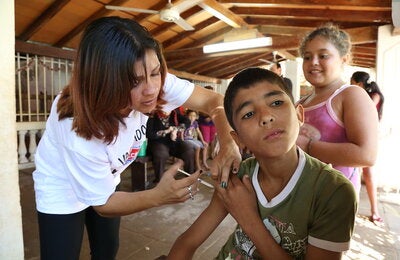
Washington, D.C., 11 December 2012 (PAHO/WHO) — With population aging, growing numbers of people are becoming more vulnerable to ill health, declining autonomy, poverty, neglect and abuse. For this reason, protecting and promoting the health and human rights of seniors is more urgent than ever, said experts on aging and human rights during a Dec. 10 event marking Human Rights Day 2012.
"In the region of the Americas, by 2020 the number of adults over 60 is expected to double from 100 million in 2006," said Dr. Mirta Roses, Director of the Pan American Health Organization/World Health Organization (PAHO/WHO). "While this reflects major public health successes over the past century, it also means an increase in chronic diseases, disabilities, and the need to respond to this population."
Human Rights Day—celebrated each Dec. 10—marks the anniversary of the 1948 adoption of the Universal Declaration of Human Rights by United Nations member states. The historic accord provides a valuable framework for promoting seniors' health and human rights, said PAHO/WHO Human Rights Law Advisor Javier Vasquez. "The Universal Declaration unites public health strategies on older persons—strengthening norms on gender equality and interculturality—and provides a solid legal framework for those determinants, with not just recommendations but legal responsibilities for States, international agencies, civil society, and other actors."
"Reaching the highest level of health and well-being is only possible when we can exercise our full rights," said Dr. Roses. "That's why we celebrate this day with a commitment to working together for older adults, a group that some of us already belong to, and all of us undoubtedly someday will."
Special working groups have been established by both the United Nations and the Organization of American States (OAS) to study the situation of human rights of older persons. The United Nations Open-Ended Working Group on Aging and the OAS Working Group on Protection of the Human Rights of Older Persons are discussing strategies and legal instruments to protect the rights of older persons in such areas as legal capacity, palliative care, procedures for admission to long-term care facilities, prohibitions on inhumane treatment in such facilities, informed consent, the right to live with dignity and autonomy, and the right to the enjoyment of the highest attainable standard of health, among others.
Ms. Kathy Greenlee, Administrator and Assistant Secretary for Aging in the U.S. Department of Health and Human Services (HHS) noted that the United States is actively involved in the United Nations group and supports related efforts such as the Madrid International Plan of Action on Aging.
"The United States is committed to learning from our partners across the region and around the globe," she said. "The more we work together, the faster we will be able to test new strategies, learn what works, and implement them in our own communities."
A new clinical guide presented during the Human Rights Day event by PAHO/WHO's Advisor on Healthy Aging, Dr. Enrique Vega, incorporates human rights principles into primary health care for older persons. The guide, which is expected to be finalized in early 2013, urges those who care for seniors to respect and promote such rights as the right to equality and nondiscrimination irrespective of age, the right to independence and autonomy, the right to liberty and personal security, the right to social security, the right to political participation and voting, and the right to dignity at the end of life.
During the event, PAHO Director Mirta Roses presented a special recognition to Dr. Alicia Kirchner, Minister of Social Development of Argentina, for her promotion of health and human rights for older persons within Argentina and internationally, including through her participation in the development of the OAS Draft Convention on the Human Rights of Older Persons.
Also recognized for their efforts to promote health and human rights were PAHO/WHO's Country Office in El Salvador, the PAHO/WHO Neglected Diseases team, and PAHO/WHO Assistant Director Socorro Gross, for her support of mainstreaming a human rights approach within the Organization.
Other participants in PAHO/WHO's Human Rights Day event included Ms. Ana Pastorino, President of the OAS Working Group on the Human Rights of Older Persons and Alternate Representative of Argentina to the OAS; Mr. Mario López, Human Rights Law Specialist, Inter-American Commission on Human Rights (IAHCR); and Ms. Rosemary Lane, Senior Social Affairs Officer, Division for Social Policy and Development, Department of Economic and Social Affairs, United Nations.
PAHO, which celebrates its 110th anniversary this year, is the oldest international public health organization in the world. It works with its member countries to improve the health and the quality of life of the people of the Americas. It also serves as the Regional Office for the Americas of WHO.



